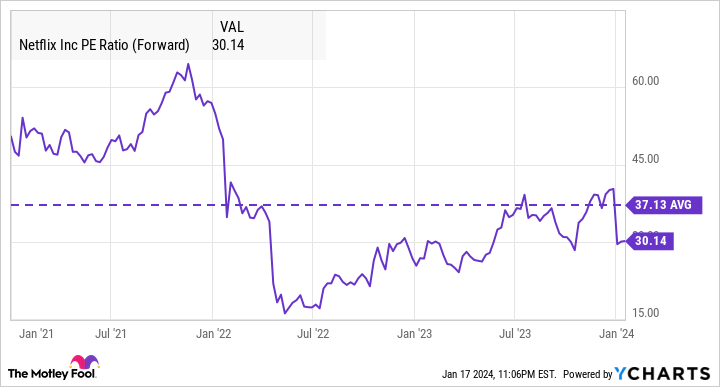Streaming pioneer Netflix (NFLX -0.19%) was long considered by viewers to be the best streaming option available due to its vast library of original and licensed content.
But as the cord-cutting trend has become more mainstream, a vast number of competing services have been launched, many by entertainment giants with their own massive quantities of high-quality intellectual property. Also, Netflix’s licensing rights for some popular shows and movies are returning to their original owners. As a result, and with competition surging, Netflix has been forced to seek growth from other sources.
For the last several years, the company’s revenue growth relied on big investments in original content to entice people to subscribe, along with recurring subscription price hikes. However, many competing platforms also offer original content, and raising subscription prices too much carries the risk of inducing a mass churn among subscribers.
A little over a year ago, Netflix launched its latest tool for generating revenue and earnings growth: a lower-priced subscription tier featuring ads.
Earlier this month, a top manager shed some light on the progress of Netflix’s ad business. Let’s dig in and assess whether now is a good time to scoop up shares of Netflix.
New year, new Netflix?
In November 2022, Netflix began offering its advertising tier in 12 countries — just a small slice of the 190-odd countries in which operates.
While watching commercials during a show or movie can be distracting, the carrot is that this tier is Netflix’s most affordable pricing plan. Anecdotally, I had reached my limit with the streamer’s price hikes, but was not at a point where canceling entirely seemed like the optimal solution. So when the company released its ad-supported tier, I jumped at the opportunity to alter my subscription.
One year into this reimagined Netflix, I can’t say I’ve noticed much of a difference — and I’m not the only one. According to a company-issued note back in November, Netflix boasted 15 million global monthly active users (MAUs) on its advertising tier. Moreover, in the company’s third-quarter earnings report, management stated that 30% of new signups were on the advertising tier.
Although this growth is encouraging, a more recent announcement from the company raised my eyebrows. According to recent commentary from Amy Reinhard, Netflix’s president of advertising, the company’s ad tier now has over 23 million MAUs.
Not only is this a notable increase from November, but the inflow of new subscribers on this plan is coming at a very interesting time.
Image Source: Getty Images
Why Netflix could benefit from ads in 2024
When it comes to advertising, one of the most important aspects for investors to understand is that spending is cyclical. And 2024 is likely to be a year in which ad spending ticks up given the election cycle just getting underway.
According to a report from AdImpact, political campaign ad spending in the U.S. is forecast to eclipse $10 billion this year and hit the highest level ever.
While the majority of that spending is expected to be allocated toward broadcast and cable television, the AdImpact report suggests $2.5 billion will go towards ads on connected TV devices and digital platforms.
I suspect political campaigns — and brands in general — will want to reach the eyes of the rising number of people subscribing to Netflix’s ad tier. As such, it could end up seeing a more meaningful contribution to its financials from those ad-supported subscriptions in 2024.
Should you invest in Netflix stock?
NFLX PE Ratio (Forward) data by YCharts
As a growth stock, Netflix often trades with some hard-to-stomach volatility. It seems like each quarter, investors either cheer or jeer the company based on its subscriber growth numbers. But over the long term, Netflix has proven in many different ways that it can generate meaningful growth. Netflix currently trades at a forward price-to-earnings multiple of 30.1 — well below the company’s three-year average of 37.1.
Given that advertising has only been a feature of the platform for a little over a year, and in a limited way, it’s highly unlikely that this new offering is moving the needle just yet. However, there are clear signs that more people are choosing this option, which could be a long-term catalyst for its financials. Furthermore, its success in a small number of its markets could lead it to gradually expand this offering to more geographies.
As more people sign up for Netflix’s ad-supported tier, the company should eventually be able to command more attractive pricing terms from marketers and brands looking for additional surface area on the streaming giant. While it still has a lot to prove, early signs indicate that Netflix’s bet is paying off. Overall, I am bullish that advertising will be a meaningful driver for the streamer over the long term, and think that 2024 could be a great year for the company.




